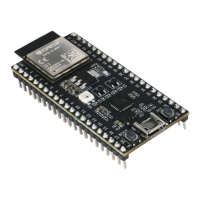Chapter 2. API Reference
(continued from previous page)
};
/* Set security for communication at application level. Just like for
* request handlers, setting security creates an endpoint and␣
,→registers
* the handler provided by protocomm_security1. One can similarly use
* protocomm_security0. Only one type of security can be set for a
* protocomm instance at a time. */
protocomm_set_security(pc, "security_endpoint", &protocomm_security1,␣
,→&pop_obj);
/* Private data passed to the endpoint must be valid throughout the␣
,→scope
* of protocomm endpoint. This need not be static, ie. could be␣
,→dynamically
* allocated and freed at the time of endpoint removal */
static uint32_t priv_data = 1234;
/* Add a new endpoint for the protocomm instance, identified by a␣
,→unique name
* and register a handler function along with private data to be␣
,→passed at the
* time of handler execution. Multiple endpoints can be added as long␣
,→as they
* are identified by unique names */
protocomm_add_endpoint(pc, "echo_req_endpoint",
echo_req_handler, (void *) &priv_data);
return pc;
}
/* Example function for stopping a protocomm instance */
void stop_pc(protocomm_t *pc)
{
/* Remove endpoint identified by it's unique name */
protocomm_remove_endpoint(pc, "echo_req_endpoint");
/* Remove security endpoint identified by it's name */
protocomm_unset_security(pc, "security_endpoint");
/* Stop HTTP server */
protocomm_httpd_stop(pc);
/* Delete (deallocate) the protocomm instance */
protocomm_delete(pc);
}
Transport Example (BLE) with Security 0
For complete example see provisioning/legacy/ble_prov
/* Example function for launching a secure protocomm instance over BLE */
protocomm_t *start_pc()
{
protocomm_t *pc = protocomm_new();
/* Endpoint UUIDs */
protocomm_ble_name_uuid_t nu_lookup_table[] = {
{"security_endpoint", 0xFF51},
{"echo_req_endpoint", 0xFF52}
};
(continues on next page)
Espressif Systems 666
Submit Document Feedback
Release v4.4

